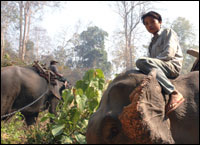globalization
-
Mexican peasants pay the price for U.S. energy consumption
Chances are, the average U.S. citizen has no idea that their demand for electricity might require that a Mexican village be flooded for a hydroelectric dam. The question is: if the environmental and human costs were known, would we consume just a little bit less? As part of my own personal battle against under-estimating people, […]
-
Tom Friedman chats with Grist about the green challenge and globalization
At a Grist gathering in Washington, D.C., earlier this month, we were pleased to host New York Times columnist Thomas Friedman for a chat on the state of green. Our intrepid video expert was on hand to tape the event. Friedman released Hot, Flat, and Crowded way back in October 2008 — before the worst […]
-
Activists are fighting a new agreement between the U.S. and Peru
A logger drives his freshly cut mahogany logs upriver toward Ivochote, a scratchy, low-slung jungle town in Peru’s eastern Amazon. Hoping to convert his illegal revenues into some weekend lovin’, he takes maca, a traditional Peruvian libido enhancer. He heads to a nearby brothel, but its employees are too busy protesting pollution caused by a […]
-
Europe should push U.S. to more fully fund the Global Environment Facility
Recently, in Moscow, at the meeting of G8 Finance Ministers, the Europeans gave us a repeat performance of an all-too-familiar pattern: they appeased George Bush at the expense of the global environment. Show us the money. Photo: iStockphoto. At last year’s Gleneagles summit of the G8 industrialized nations, the G8 leaders, led by the Europeans, […]
-
Don’t let catastrophic visions get you down … well, not all of them
We greens spend a lot of time obsessing about how life as we know it is likely to end: in a slow, painful miasma of greenhouse gases; in the violent cross fire of a nuclear gang war; in mass ignominy, dead and bug-eyed in our folding chairs after endless rounds of fruitless policy discussions. But […]
-
Logging keeps Asian elephants in business … for now
At a fork in the road, our guide points to the right. “That’s the main road there,” he says. “We’ll go on this smaller road, deep into the jungle.” A glance to the left reveals a narrow, unpaved track, which he tells us is used primarily by logging trucks. It’s the dry season in Myanmar, […]
-
Will hard-won environmental and social gains survive China’s economic rise?
The way China has catapulted itself onto the Monopoly board of global capitalism has caught most Western leaders on the hop. Like Butch Cassidy and the Sundance Kid looking back at their pursuers, top U.S. and European Union businesspeople are wondering, “Who are those guys?” Yuan-a make a deal? After all, how much do we […]
-
Are corporations hog-tying conservation groups in CAFTA fight?
Macaws and effect in Central America. A year ago, President Bush signed the Central American Free Trade Agreement. Since then, the controversial plan has inspired protests across the U.S. and in Central America. And while past trade agreements have been ratified by Congress in less than two months, the Bush administration has delayed the vote […]
-
Jared Diamond’s Collapse traces the fates of societies to their treatment of the environment
I will always think of Jared Diamond as the man who, for the better part of the late 1990s, somehow made the phrase "east-west axis of orientation" the most talked-about kind of orientation there was -- freshman, sexual, or otherwise. His 1997 Pulitzer Prize-winning book Guns, Germs, and Steel: The Fates of Human Societies began with a simple question -- "Why did Pizarro conquer the Incas and not the other way around?" -- and then managed to tell, over the course of only 400-odd pages, the history of why humanity has turned out the way it has. For most readers (and there were millions), Guns was their first exposure to theories of geographic determinism. To broadly simplify, Diamond's book posited that human populations on continents with a primarily east-west orientation benefited from a more consistent climate and therefore developed more quickly than those living on continents with a north-south orientation. It had the kind of paradigm-shifting impact that happens with a book only once every few years, and it turned Diamond -- a professor of geography at UCLA -- into something of a rock star.






